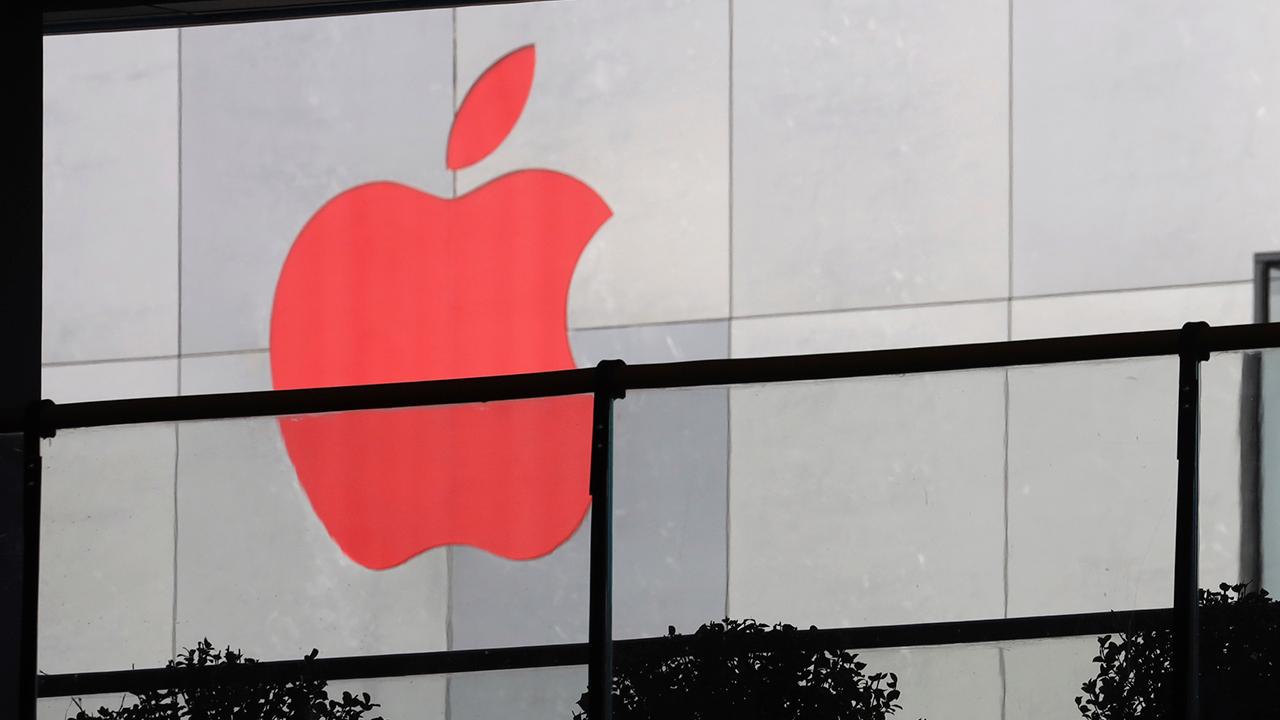Independent repair shops disappointed with Apple’s repair programs
Right-to-repair activists say the issue of tight repair restrictions extends beyond Apple into other industries
Some independent tech repair shops are disappointed with Apple's fairly new plan to provide them with Apple equipment and repair guides to fix customers' iPhones.
The tech giant said in an August statement that it would start providing Apple certification classes to technicians, Apple-genuine iPhone parts and tool guides to independent repair providers (IRPs) so they could get the same benefits as Apple's repair partners and better fix out-of-warranty iPhones for the same cost as AASPs, Apple said in a statement.
“We are committed to giving our customers more options and locations for safe and reliable repairs. Our new IRP program is designed to give repair businesses of all sizes access to genuine parts, training and tools needed to perform the most common iPhone repairs," Apple told FOX Business in an email after it was made aware that some independent technicians are unhappy with the program.
"We are excited by the initial response and high level of interest. We are working closely with interested parties and we will update language in our materials to address their feedback," the company added.
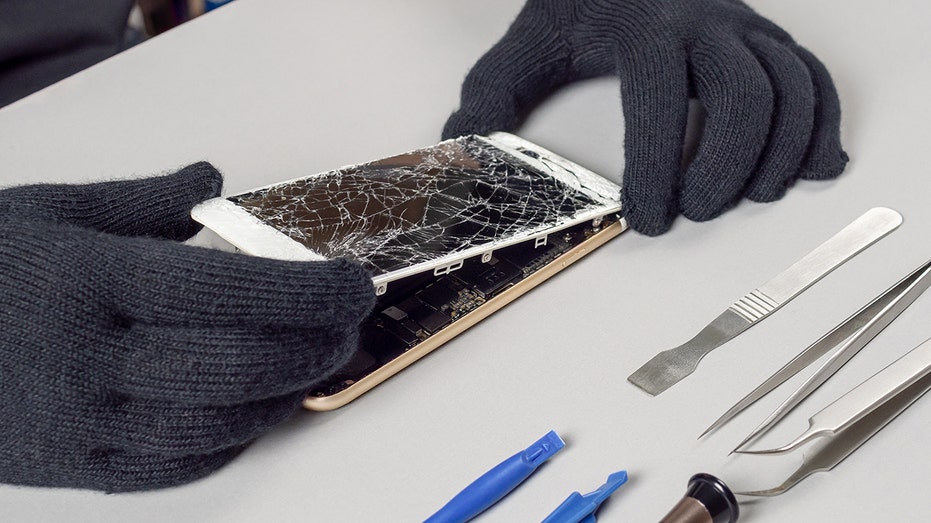
The only difference between Apple's repair partners, otherwise known as "Apple Authorized Service Providers" (AASPs) --- think BestBuy --- and IRPs is the fact that AASPs can only use Apple-genuine parts to fix in- and out-of-warranty phones whereas IRPs can use third-party parts in addition to Apple-genuine parts to fix out-of-warranty batteries and screens, so as long as they disclose that information to customers.
"We were actually kind of excited about the program," Matt McCormick, founder of the independent Seattle-based repair shop Jet City Device Repair, told FOX Business.
"We put together a huge package of data to apply, they accepted us [as an IRP] and got back to us with a contract. But when we looked at the contract, the prices for Apple parts were so high that we decided not to read any further," he said.
Apple's IRP announcement came after the company faced scrutiny for its tight restrictions over who could and could not repair iPhones, directing customers to make reservations at the store's Genius Bar --- infamous for its long wait times --- or at AASP stores in what some small businesses said violated their "right to repair."
SMALL TECH COMPANIES PLEAD, 'HELP US, CONGRESS,' AGAINST BIG TECH
Right to repair has become an increasingly popular free-market movement within tech and other industries.
"Apple will provide more independent repair businesses — large or small — with the same genuine parts, tools, training, repair manuals and diagnostics as its AASP The program is launching in the U.S. with plans to expand to other countries," the tech giant's August statement reads.
Apple Chief Operating Officer Jeff Williams said that to meet customers’ needs, the company is "making it easier for independent providers across the US to tap into the same resources as our AASP network."
But that wasn't convincing enough for Congress.
The House Judiciary Committee sent a letter to Apple CEO Tim Cook on Nov. 13 informing him that the committee was investigating the tech giant's "competition in digital markets," specifically including its AASP program, as part of a broader antitrust investigation into not only Apple, but Google, Facebook and Amazon, as well.
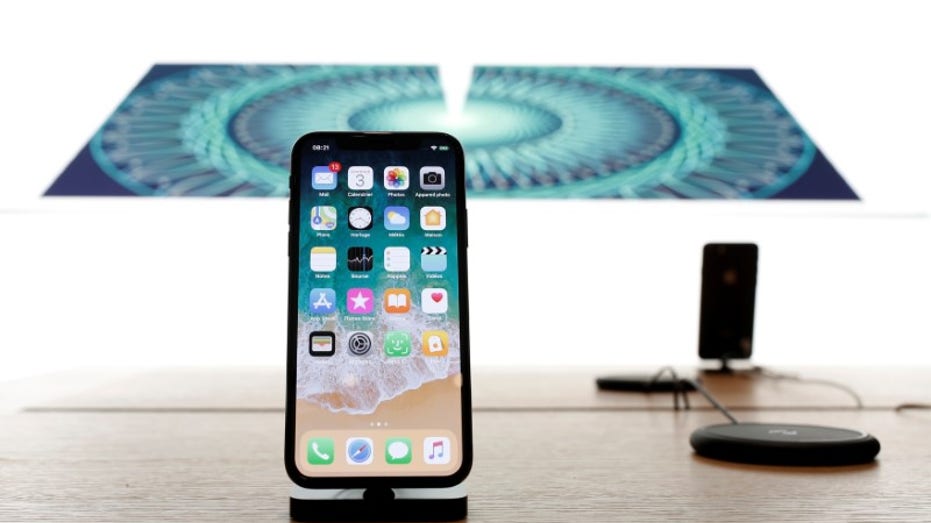
The new iPhone X is pictured at the Apple Store Marche Saint-Germain in Paris, France, Nov. 3, 2017. (REUTERS/Benoit Tessier)
Apple responded to a series of questions from Congress later in November saying it recommends repairs are "conducted by a certified technician who has completed Apple service training and who uses Apple-genuine parts and tools," saying, "Genuine Apple parts are designed, tested and manufactured for Apple quality and performance standards."
"We continue to focus on providing customers convenient access to authorized repair locations," Apple said in its replies, mentioning its AASP program, "but we will never compromise on safety."
APPLE OUTSELLS ENTIRE SWISS WATCH INDUSTRY IN 2019
McCormick is arguing that despite the fact that Apple said it would provide independent repair businesses with the tools necessary to fix iPhones with original equipment manufacturer (OEM) Apple parts such as batteries and screens, Apple's plan was to sell its equipment to small businesses for what he thinks are overly expensive prices. Additionally, IRPs cannot provide Apple warranty for Apple parts.
Such costs and restrictions would have a significant impact on profitability for IRP iPhone repairs. IRPs can typically replace a phone screen or battery for well under $100.
Apple charges $129 to repair the screen of an iPhone 5C, which came out in 2013, according to its website. An iPhone 11 Pro Max screen repair costs $329 through Apple. The company says these repairs should make damaged phones work the same way they did when they were purchased.
"The cost for the OEM parts is more than what we charge for a repair," he said.
McCormick said there are a number of online forums for owners, employees and customers of small repair stores like his who agree that Apple's announcement to offer these tools to fix iPhones to independent shops "is a joke."
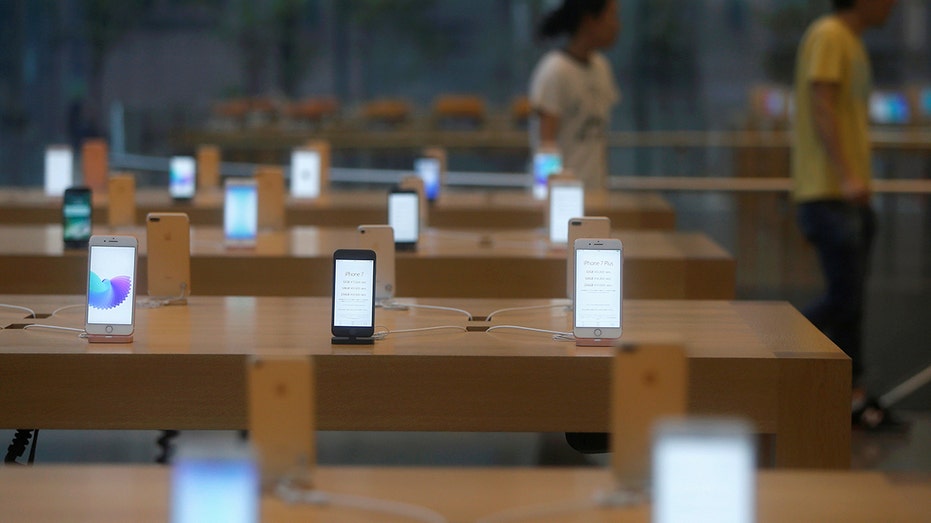
Apple's new iPhones are displayed before the opening of the Apple Store in Tokyo's Omotesando shopping district, Japan, Sept. 16, 2016. (REUTERS/Issei Kato)
One such Reddit user who goes by the online alias "Fudge" wrote a post on the website's Apple subreddit page detailing his thoughts on Apple's IRP program as a former third-party repair shop employee and AASP technician.
"The back-end systems broken, the documentation is abysmally bad, and it's a complete Australia-scale dumpster fire," said Fudge, who spoke to FOX Business on the condition of anonymity to keep his personal opinions about Apple separate from his professional identity.
"The pricing and terms are awful, the benefits are horrible, and there's a lot of other 'gotchas' that make it a bad investment" for independent shops, Fudge said.
FACEBOOK SUED IN US FEDERAL COURT FOR ALLEGED ANTI-COMPETITIVE CONDUCT
Fudge agreed with McCormick that the program is "a joke."
"Prices are crippling, you can't provide any warranty from Apple even though you're using Apple parts, the bureaucratic processes ruin the experience," he said, adding that "no documentation means being thrown into the Global Service Exchange --- Apple's god-awful system for creating and managing repairs --- without help."
Apple maintains that its repair-related systems and documentation related to repair are successfully used daily by thousands of AASPs, and the IRP program has received a lot of interest.
Fudge then explained the differences between the issues with Apple's IRP program versus Apple's success with AASPs.
"In the third-party world, margins are usually thin. Because of the flood of cheap garbage quality parts, and even mid-tier garbage parts, prices have to be dropped in order to remain competitive. This pricing from Apple makes this impossible to realistically continue," he explained.
"In the AASP world, it's a bit different. People are used to apples high prices, plus we get some sort of labor compensation from Apple if we do repairs under warranty, Applecare, or any repair extension programs," Fudge said. "For out-of-warranty repairs, we're free to charge our own labor rates since Apple doesn't compensate us."
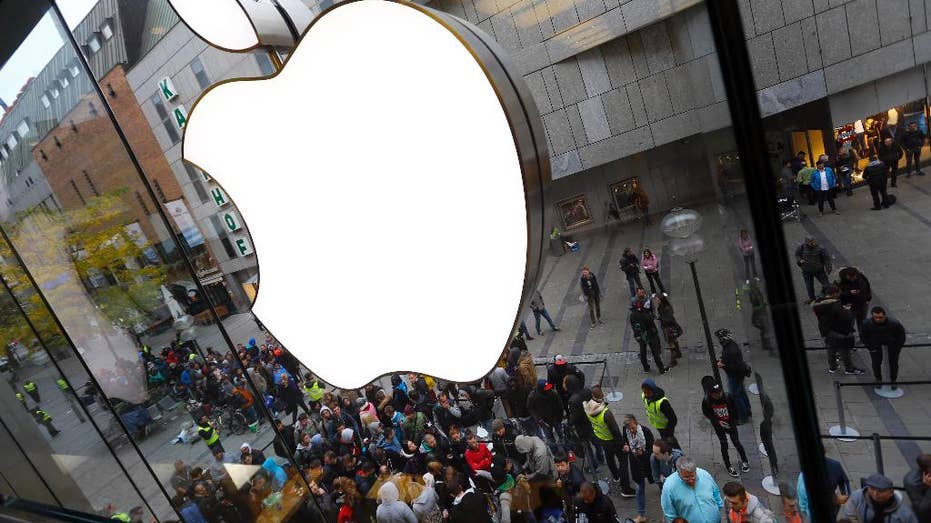
People wait in front of an Apple store in Munich before the worldwide launch of the iPhone 6s. (AP Photo/Matthias Schrader, File)
McCormick echoed Fudge's concerns about the IRP program.
"No way you could compete with all those businesses if you sign up with this program," he said. "It's a hyper-competitive business, so every dime counts."
"There's absolutely no reason anyone should want to do this," he said, adding that if Apple had some kind of marketing program that shared the names and locations of its AASPs, McCormick may have been more willing to partner with the tech giant and buy its OEM parts for such high costs. But even that is not a possibility, he said.
"As far as I could tell, there was no offer from Apple to help you do anything," he said. "You could buy the parts, and then you were on your own to market your business."
Additionally, third-party repair shops don't have the same incentives as the Apple store to convince its repair customers to buy new phones. McCormick said customers come into his shop "all the time" saying Apple couldn't repair their phones and suggest they buy new ones when the phones or their charging ports are, in fact, fixable.
APPLE ANTITRUST INVESTIGATORS QUESTION APP DEVELOPERS: SOURCES
"There are a lot of other little things that will go wrong, like with charging ports, and Apple won't fix those," he explained. "Why? My guess is that it does take a lot more skill. Screen and battery fixes are pretty easy to do."
McCormick and Fudge recommended commentary by independent repair technician Louis Rossmann, a critic of Apple's repair restrictions and right-to-repair advocate. Fudge is currently a moderator on Rossmann's discord server.
In one YouTube video, Rossman brings up Apple's practice of alerting iPhone users who replace dying Apple batteries with third-party batteries to save money that their batteries are low-grade, despite the fact that they work normally.
"When you replace the battery in the phone, it will still tell you, 'Replace,' or 'Service Battery,' or 'Poor Battery Health,"' he said. "It's going to erode the trust that consumers have in independent repair, and it's going to ad a lot of friction to these interactions [between independent repair shops and consumers] to the point where consumers will say, 'Might as well just go to the Apple Store.'"
I replaced my own iPhone battery with a third-party battery and, out of curiosity, when I checked the battery health on my phone, I realized I had the same notice Rossmann mentions in the video, despite the fact that my battery has given me no issues since I replaced it.
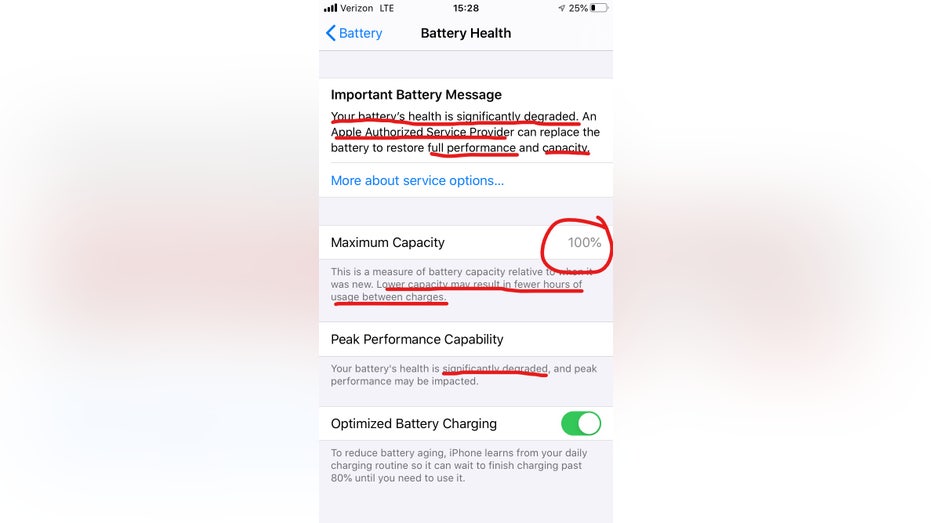
Screenshot (FOX Business)
Rossmann likened the situation to seeing a car's oil replacement light come on right after an independent auto repair shop changes the car's oil.
"It's going to erode the trust you have in that mechanic," Rossmann said. "And one of the things that I've been trying to do over the past five or six years ... is build up that trust and goodwill so that when things like this happen, it isn't the independent repair shop screwing them over — it's the Apple Store."
APP CREATORS WHO ALLEGED APPLE ANTITRUST VIOLATIONS TRY TO RALLY DEVELOPERS AGAINST BIG TECH
In December, Rossmann posted another video calling Apple's IRP program a "joke" and "useless PR stunt" to avoid further antitrust questions from Congress.
Rossmann said a number of people signed nondisclosure agreements with Apple to become an Apple-certified IRP and related their experiences back to him. McCormick also mentioned getting an NDA from the company after his shop was accepted but said he did not sign it.
He shared one story in which the person who went through with the requirements to become an Apple-certified IRP said Apple will charge an IRP "$25 for the battery if you return the old one," but it will charge you "$101.25 if you don't return the old one."
"This is insane," Rossmann said, adding later, "There's no money to be made here."
So, if Apple doesn't provide low-cost parts to independent device repair shops that fix damaged iPhones, what do they use instead?
McCormick pointed to ever-improving Chinese technology and manufacturers who have learned to make near-identical screens and batteries for iPhones even though they aren't actually OEM Apple parts. An independent repair shop in Washington, D.C., charges less than $90 for an iPhone 7 screen repair --- less for older models and more for newer models.
APPLE DELAYS CHINA STORE REOPENINGS
"Anybody telling you they're selling an OEM Apple screen for $20 or $30 --- that's just not true," McCormick said. "In the last year to 18 months, the quality of the parts coming from China are almost indiscernible from the OEM versions."
He added that "Apple has clamped down really hard on their supply" in recent years. "They used to release old parts into the market until the iPhone 5S came out, and overnight, supply diminished. Chinese factories started coming online."
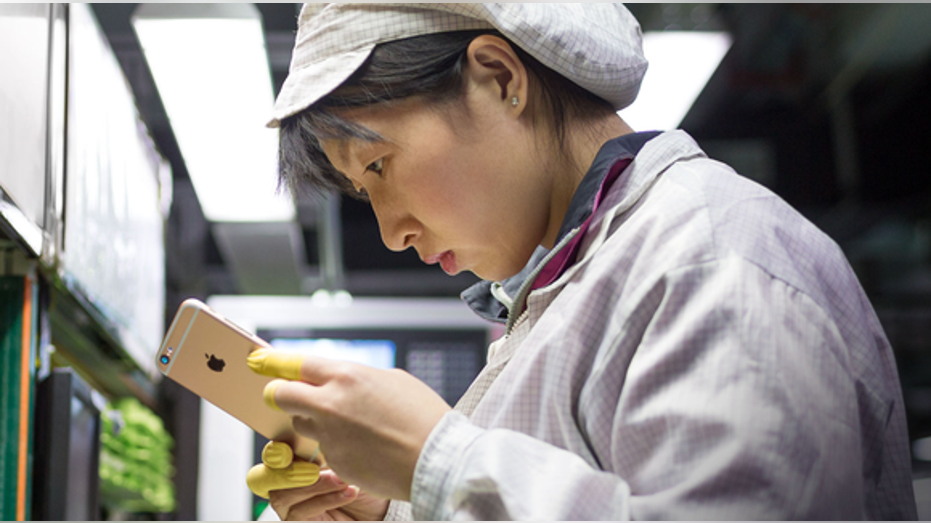
A worker inspects an iPhone.
But it's not just an Apple issue. Right-to-repair activists say the topic of tight repair restrictions extends beyond Apple into other industries.
McCormick brought up John Deere tractors, saying tractors in need of repair won't operate unless they are fixed with genuine John Deere parts by a John Deere dealership employee.
"If a farmer bought the tractor, he should be able to do whatever he wants with it," Kevin Kenney, a farmer from Nebraska, told Vice's tech outlet, Motherboard, in 2018. "You want to replace a transmission and you take it to an independent mechanic — he can put in the new transmission but the tractor can't drive out of the shop. Deere charges $230, plus $130 an hour for a technician to drive out and plug a connector into their USB port to authorize the part."
So farmers turned to foreign John Deere code hackers in Poland and Ukraine for help.
CLICK HERE TO READ MORE ON FOX BUSINESS
"There's software out there a guy can get his hands on if he looks for it," one farmer and repair mechanic in Nebraska who uses said software told Motherboard. "I'm not a big business or anything, but let's say you've got a guy here who has a tractor and something goes wrong with it — the nearest dealership is 40 miles away, but you've got me or a diesel shop a mile away."
"The only way we can fix things is illegally, which is what's holding back free enterprise more than anything and hampers a farmer's ability to get stuff done, too," he added.
The point of all this is to say that right-to-repair issues are increasingly appearing in other industries.
"Most people don't seem to realize that this could be very impactful on their everyday lives if other companies say, 'Hey look we can put chips on our components and force people to buy our parts for our products,'" McCormick said.
Fudge said the only way to resolve this issue is to "work with the repair market instead of against it."
"Simply blocking stuff hasn't worked out, ever," Fudge said. "The right way is to actually sit and work out the core problems on both sides rather than create more restrictive policies that not only hurt consumers' choices but also make the company seem like an ass and allow the creation of more e-waste."
This post previously had quotes that say Apple did not let IRPs stock parts. Apple said IRPs are able to stock parts if they choose, and customers get to decide which parts they want for a repair.




















